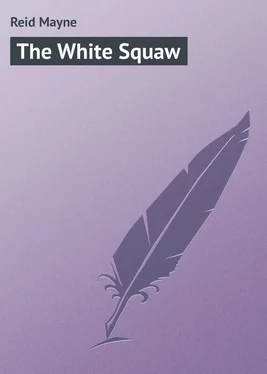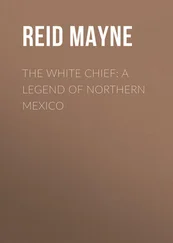Mayne Reid - The White Squaw
Здесь есть возможность читать онлайн «Mayne Reid - The White Squaw» — ознакомительный отрывок электронной книги совершенно бесплатно, а после прочтения отрывка купить полную версию. В некоторых случаях можно слушать аудио, скачать через торрент в формате fb2 и присутствует краткое содержание. Жанр: foreign_prose, на английском языке. Описание произведения, (предисловие) а так же отзывы посетителей доступны на портале библиотеки ЛибКат.
- Название:The White Squaw
- Автор:
- Жанр:
- Год:неизвестен
- ISBN:нет данных
- Рейтинг книги:3 / 5. Голосов: 1
-
Избранное:Добавить в избранное
- Отзывы:
-
Ваша оценка:
- 60
- 1
- 2
- 3
- 4
- 5
The White Squaw: краткое содержание, описание и аннотация
Предлагаем к чтению аннотацию, описание, краткое содержание или предисловие (зависит от того, что написал сам автор книги «The White Squaw»). Если вы не нашли необходимую информацию о книге — напишите в комментариях, мы постараемся отыскать её.
The White Squaw — читать онлайн ознакомительный отрывок
Ниже представлен текст книги, разбитый по страницам. Система сохранения места последней прочитанной страницы, позволяет с удобством читать онлайн бесплатно книгу «The White Squaw», без необходимости каждый раз заново искать на чём Вы остановились. Поставьте закладку, и сможете в любой момент перейти на страницу, на которой закончили чтение.
Интервал:
Закладка:
She smilingly approached Oluski, and nestled close to the old chief.
Wacora seemed puzzled by the fair presence.
“I had forgotten,” said Oluski, “that you are strangers to each other. Sansuta, your cousin Wacora stands before you.”
Sansuta – for she it was – smiled upon the young Indian.
He did not approach the spot where father and daughter stood.
His impassioned eloquence had vanished.
He could scarce find words for the simplest salutation.
Oluski, perceiving his bashfulness, hastened to his relief.
“Sansuta has been upon a visit, and has only now returned. It is many years since you have seen her, Wacora. You did not expect her to have grown so tall?”
Wacora finished the sentence.
“Nor so beautiful!” he said.
Sansuta cast down her eyes.
“No praise like that should reach an Indian maiden’s ear,” said Oluski, with a smile; “nevertheless, Sansuta is as the Great Spirit has made her, that is sufficient.”
The girl did not seem to share her father’s sentiments; a slight pout of her beautiful lips implied that the compliment was by no means unpleasant.
Wacora was again dumb, as if half regretting what he had said.
Such is the power that beauty exercises over bravery.
The young Indian warrior actually blushed at his boldness.
“But what brings you here, Sansuta?” asked her father. “Did you not know that your cousin and myself were in council?”
The pretty Sansuta had recovered her composure.
The pout had disappeared from her lips, which, opening to answer her father’s question, revealed two rows of teeth of a dazzling whiteness.
“I am here to bid you both to the evening meal,” she said.
Her voice, melodious and soft, struck upon Wacora’s ear like the music of the mocking-bird.
The charm was complete.
Forgetful of his late conversation, forgetful for a time of his thoughts and aspirations, oblivious of his enthusiasm, he stood a very child, eagerly watching her and listening for those tones again.
It was Oluski, however, who spoke.
“Come, Wacora, let us go with her.”
The old chief strode away from the spot, Sansuta by his side.
Wacora followed, with a new feeling in his heart.
It was love!
Chapter Nine.
The Indian Village
A week later the table top of the hill over-looking the settlement presented a changed picture.
It was one of active life.
The naked poles, formerly standing there, had disappeared, and comfortable Indian dwellings – wigwams – were in their place.
At the doors of several were planted lances and spears, with plumes and pennons depending from them.
These were the residences of the chiefs.
In the centre of the group was a large building, which was carefully, almost elaborately constructed, and which far o’ertopped over the others.
It was the council house of the tribe.
Around the doors of their respective dwellings, the owners might be seen engaged in every variety of employment or peaceful idleness. Children frolicked in the presence of their parents, and dusky maidens, in twos and threes, loitered up and down the main street or avenue.
At one of the doors an interesting group seemed rapt in attention at the recital of a story that was being told by an aged chief.
The chief was Oluski, and among the individuals around was his daughter, Sansuta.
The others were his kindred.
They had assembled, as was their usual evening custom, in front of his wigwam, to listen to tales of virtue or valour; of deeds done by their ancestors in the days of the early Spanish settlers.
The Indians are admirable listeners, and, in the easy natural attitudes into which they fell as they lent forward to catch Oluski’s words, they formed a charming tableau.
The venerable chief, with dignified action, measured speech, and great skill in modulating his voice, held their attention as much by the manner as the matter of his narrative.
As the incident he was relating developed pathos, chivalry, horror or revenge, so did his audience yield themselves to its influences. By turns they lowered their eyes, shuddered, stared wildly around with knit brows and clenched hands.
Like all people constantly communing with nature, they were easily moved to joy or sorrow; and not civilised enough to make any attempt at concealing it.
As Oluski sat in their midst, the observed of all observers, he looked the picture of a patriarch.
The time and piece were both in harmony with the subject.
Oluski’s story drew to a close. His hero had achieved his triumph. The distressed Seminole maiden was rescued, and joy and union wound up the tale, which had for more than an hour held his listeners enthralled.
“So now, children, away! The sun is sinking in the west; the hour of council is at hand, and I must leave you. Return to-morrow, and I will relate to you some other episode in the history of our tribe.”
The young people rose at the chief’s bidding, and with “thanks” and “good nights,” prepared to depart; Sansuta among the rest.
“Where are you going child?” asked her father.
“Only to the spring, father. I shall be back soon.”
As the girl said this, she turned, as if wishing to avoid her father’s gaze. The other people had all departed.
“Well,” said the old man, after a pause, “do not forget to return soon. I would not have you abroad after nightfall.”
She murmured a few words, and sauntered away from the spot.
Oluski did not immediately depart, but stood leaning against the spear that stood up in front of his dwelling.
The old man’s eyes were filled with tears, while a hand was laid upon his heart.
“Poor girl,” he reflected, as he watched her form disappearing in the fast darkening twilight; “she never knew her mother. I sometimes think I have been but a poor guardian of Sansuta’s steps. But the Great Spirit knows I have tried to do my duty.”
Sighing heavily, he brushed the tears from his eyes, and strode off to the council house.
Chapter Ten.
An Appointment Kept by Deputy
Let us follow the steps of Sansuta.
Once out of sight, and conscious that she had eluded her father’s observation, she quickened her steps, not in the direction of the spring, but towards a thick clump of live oaks which grew at the foot of the hill.
As she approached the spot, her pace gradually became slower, until she at length came to a stop.
As she paused, a shiver ran through her frame.
She was evidently in doubt as to the propriety of what she was doing.
The sun had sunk below the horizon, and darkness was rapidly falling over the landscape.
A distant murmuring alone gave token of the proximity of the Indian village upon the hill.
After a few moments, and while Sansuta still stood beside the grove, these sounds ceased, and perfect silence reigned around the spot.
Presently a cuckoo’s note was heard – followed by another nearer and louder – that in its turn succeeded by three others.
Whilst the echo of the last still vibrated on the evening air, the maiden was startled by a sudden apparition.
It sprang into view at her very feet, as if the ground had opened suddenly to give it passage.
When the girl regained courage sufficient to look upon it, her fears were in no way lessened.
Standing in a grotesque attitude, she beheld a negro, with arms enveloped in a ragged garment, moving about like the sails of a windmill, whilst a low chuckle proceeded from his huge mouth.
“He! ho! ho! brest if de ole nigga didn’t skear de galumpious Injun. He! he! he! ’gorry if de Injun beauty ain’t turn white at de show of dis chile!”
Читать дальшеИнтервал:
Закладка:
Похожие книги на «The White Squaw»
Представляем Вашему вниманию похожие книги на «The White Squaw» списком для выбора. Мы отобрали схожую по названию и смыслу литературу в надежде предоставить читателям больше вариантов отыскать новые, интересные, ещё непрочитанные произведения.
Обсуждение, отзывы о книге «The White Squaw» и просто собственные мнения читателей. Оставьте ваши комментарии, напишите, что Вы думаете о произведении, его смысле или главных героях. Укажите что конкретно понравилось, а что нет, и почему Вы так считаете.












